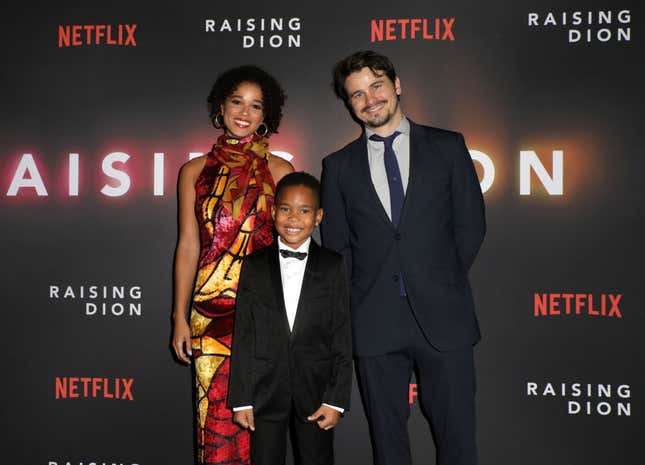
Netflix’s original series, Raising Dion, dropped on Friday, October 4, and became my newest binge. I watched all nine episodes over the weekend and now I feel like talking about it. While watching, I made some observations that I’ve turned into very black reasons to check out the series. I wanted to share them with you.
Just so we’re on the same page: Raising Dion is a series about a young boy who has powers and has to learn how to use them with the help of his mother and godfather. It turns out that there’s a whole lot more to this story; it’s also much more family-friendly than I expected. Depending on how you like your eggs—fried or fertilized—that can be a good thing or a turnoff. I have two children under 5, so anything that I can watch without too much profanity or that won’t scare the bejesus out of them is a win in my house, soul and heart—even if it treads the line of being a little too safe at times.
For my Disney parents, it’s not as corny as Descendants 1, 2 or 3, but basically has a similar feel (or like a more edgy K.C. Undercover) and some of the same types of graphics but with black leads.
To the blackness!
1. Let’s start at the top: The show is set in Atlanta and filmed around Atlanta. So even if every single person in the story isn’t black, they’re in Atlanta, which levels up the blackness by default. Extra blackness points for the main character, Nicole Reese (played by Alisha Wainwright), for living in Decatur, where it’s greater. (The eastside city isn’t really greater; I’m a westside, Adamsville, Zone 4 chap myself, but “Decatur, where it’s greater” is a good motto.)
2. Nicole’s husband is Mark Warren, played by bae-in-your-mind, Michael B. Jordan (who is also one of the executive producers for the series), and if you’ll remember, he was Erik Kilmonger in Black Panther, which is one of the blackest things to happen to blackness in at least the past 100 years. And for more extra points, Kilmonger clearly influenced one of Micah West’s hairdos on the vanta-black ass series, Queen Sugar, which is on OWN, which is owned by Oprah Winfrey. It’s blackness all around on this one.
3. Nicole and Mark’s son’s name is Dion, played by Ja’Siah Young. Listen, I’m sure you can google “people named Dion” and find some very fine non-black people. I just did it and a singer named Dion DiMucci is the very first hit. However comma, (if you write the word comma, do you have to still put a comma after it? And is a comma AFTER the word comma like, extra meta? My brain hurts.) if you were reading the newspaper and playing “Guess The Race” and read about a person named Dion in Atlanta, what race would you think they were? If you said “black” give yourself a pat on the back and have a drink on you later this evening.
4. Alvin Ailey gets several nods in the series. Nicole is a former ballet dancer who still wants to be a ballet dancer even though she keeps trying to convince us and everybody watching that she is no longer in dancer shape. Point is, shouts out to Alvin Ailey. That’s black.
5. In an early scene, I happened to notice that Nicole, mother of Dion, wife of Mark, love interest of Pat, who was Mark’s best friend (Pat is played by Jason Ritter, who happens to be John Ritter’s son), is rocking a cut off sweatshirt that says Abby Hall. Now, I recognized the style of the shirt (courtesy of Supreme Vintage Clothing) right away because I own a shirt of the same style that says White Hall, which was my freshman dorm at Morehouse College. Abby Hall is a freshman dorm on the campus of Spelman College. I touched my chest and said, “Well I’ll be.” It turns out that the first episode (and a few others) was directed by Seith Mann, who is an alumnus of Morehouse College. We are abounding, you hear me, abounding in blackness.
6. This means that the character of Nicole went to Spelman.
7. In the final episode, Nicole who is perennially late for things, shows up late for her job at the Atlanta University Center Robert C. Woodruff Library, which, as you can imagine, is on the campus of the Atlanta University Center (really Clark Atlanta University). The space that I spent a significant number of hours not studying and/or sleeping was all up in the series. That could ONLY BE TOPPED BY…
8. ...the meeting between Mark and Nicole in the library that we called Club Woody, where he is donning a fly-ass Morehouse College hoodie doing that thing that I’ve never seen anybody actually do in that library—studying. Yes, we have HBCU love all up in the Raising Dion series and its even blacker counterpart: a Spelhouse baby in Dion.
Love or hate Raising Dion—and the story can legitimately take you either way; I leaned more heavily towards enjoying it because, well, anything I can watch with my kids, again, is a win—the one thing the series does is include lots of certified blackness. And I appreciate it for that reason.

